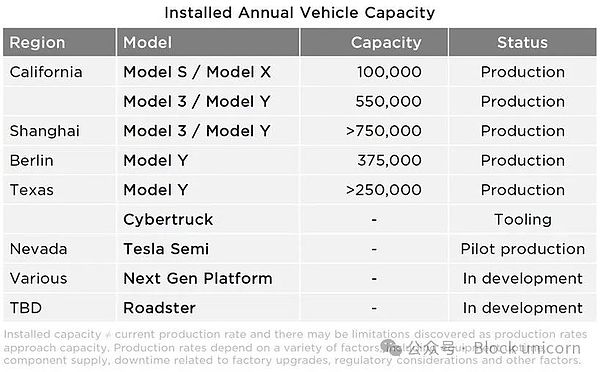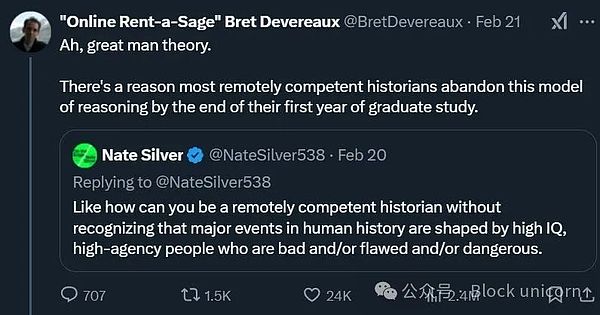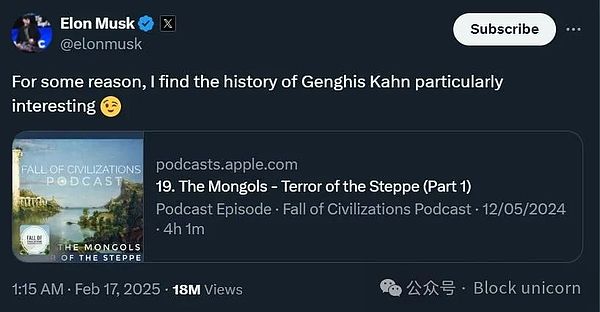Article author: Noah Smith Article compiler: Block unicorn
I am writing a long article, but it has taken me two days to finish it. In the meantime, I want to share a rather ridiculous statement I saw recently: "Elon Musk is not smart. His IQ is probably only around 100 or even lower. He is what he is today only because he was born into a wealthy family and was extremely lucky." Of course, this statement is wrong. According to biographer Walter Isaacson, Musk scored 1400 on his second SAT test in the late 1980s. SAT scores are highly correlated with IQ, and according to all the information I found, 1400 at the time corresponded to an IQ of about 130 points. In addition, Musk has a bachelor's degree in physics and was accepted into a PhD program in materials science in the 90s. His intelligence level is far above the average person.
However, the absurdity of Abramson's remarks lies not in their content, but in their purpose - he is trying to alleviate American society's fear of Musk and his role in American politics by belittling Elon Musk's IQ. This approach is very stupid.
First, IQ is not a valid measure of Musk's ability in the areas he excels in, such as organizing and improving businesses, identifying talent, managing large numbers of people, raising funds, and creating and communicating visions for the future. Keuschnigg et al. (The Flattening of Cognitive Abilities among High Income Earners, 2023) find that the effect of IQ flattens out after higher levels of wealth: "We analysed Swedish register data on cognitive ability and labour market performance for 59,000 men taking the compulsory military service test. Surprisingly, we find that, while the overall relationship between ability and wages is strong, the effect of ability flattens out after annual incomes exceed €60,000, just one standard deviation above the mean. The top 1% earners are more likely to be poor than the top 1%." ”
In the past, Americans placed great value on abilities that couldn’t be measured on a test—real-world business acumen was often prized over book knowledge. But as knowledge industries grew in importance, and the power and status of a highly educated professional class rose, American society began to worship pure intelligence. Even Americans who, when pressed, would insist that IQ is a racist and meaningless concept will not hesitate to call others “idiots” or talk about their low IQs in social media debates.
Whatever Musk’s IQ is, however, he has undoubtedly accomplished incredible feats of organization-building over the course of his career. Here’s a passage from a post I wrote about Musk last October, in which I described entrepreneurship as a superpower: “While American manufacturing (and manufacturing in Germany, Japan, etc.) has been hollowed out by Chinese competition, and our great old companies have faltered and declined, one entrepreneur has been able to build and scale enormous, cutting-edge, high-tech manufacturing companies in America that are world leaders. That person is Elon Musk.” Take SpaceX, for example. Without Musk’s company, the U.S. would have lagged far behind China in the space race. But with SpaceX, the U.S. is far ahead of China…and SpaceX is a manufacturing giant. Despite having almost all of its manufacturing done in the United States, the company was able to outpace the entire Chinese manufacturing sector in its own field… SpaceX has already launched so many Starlink communications satellites into low Earth orbit that Musk’s constellation now outnumbers all other active satellites and spacecraft combined… It’s not like other entrepreneurs haven’t tried to get into space. Jeff Bezos, the founder of the world’s top e-commerce site and cloud computing network, founded Blue Origin, a company that competes with SpaceX, but it’s far behind… But SpaceX is neither a fluke nor a special case. Despite recent increases in competition, Tesla still completely dominates the US electric vehicle market…and when Musk recently built a cluster of GPUs to train his new AI models, it did so at speeds far beyond what Nvidia CEO Jensen Huang thought possible. As an industrialist, Musk is unmatched in American history—his closest rival, Henry Ford, failed in the aerospace industry. Seth Abramson couldn’t build SpaceX, Tesla, or anything that Musk built, no matter how much money anyone offered him. Neither could I, dear reader, and neither could you. Neither, I think, could Terence Tao or any of the other super-genius mathematicians with the highest IQs on the planet. None of us, even if we spent a lifetime and burned through a trillion dollars, would likely be able to create anything approaching Musk’s high-tech industrial behemoth.
Why do we fail? Even without any institutional barriers, we can’t identify the best managers and engineers. Even if we find them, we often can’t convince them to work for us—and even if they come, we may not be able to inspire them to work their hardest every week. We also often fail to promote our best employees, give them more power and responsibility, or decisively fire underperformers. We can’t raise tens of billions of dollars at favorable interest rates to finance our companies. We can’t negotiate government contracts and generate hype for consumer products. And so on.
In addition, Musk may also do many less obvious things that we can’t:
Marc Andreessen said a key driver of Musk’s success is his obsession with solving problems quickly, often working directly with engineers or programmers who are struggling…The legendary venture capitalist shared insights from his close collaboration with Musk at X, xAI, and SpaceX…Unlike many CEOs, Musk is committed to understanding every detail of his business, said the co-founder and general partner of A16Z. He “gets to the front lines, talks directly to the people doing the work,” and acts as “the chief problem solver in the organization.”
For more than a decade, I have watched Musk successfully build seemingly impossible companies and drive them to new heights of success. And every time, there are scoffers on social media calling him an idiot, a fraud, and a charlatan, and claiming that his company is about to collapse and go out of business. Although Musk has not delivered on every promise he has ever made, he has repeatedly made those scoffers eat their words.
Moreover, Musk has achieved these achievements when the entire system of proceduralism and anti-development policies in the United States is against what he is doing. It is well known that building factories in the United States is very difficult, including land acquisition costs, procedural obstacles such as NEPA, regulations, high labor costs, and so on. Yet, as of 2023, Tesla is producing more cars in the US than in China:

Californiais notoriously one of the hardest states to build a factory in, but SpaceX builds most of its rockets there—which are far better than anything made in China—and has almost single-handedly revived the Los Angeles area’s aerospace industry. And when Musk wanted to build a data center for his new AI company, xAI—a process that would normally take years—he reportedly did it in just 19 days.
Contrary to Nate Silver’s view, these achievements have little to do with Elon’s IQ.
Some progressives still persist in mocking Musk’s intelligence, partly because of the traditional class resentment of the educated elite toward industrial giants. But I think more of it is simply what young people call a “cope mechanism.” For now, Musk is applying all the talents he brought to building his company—motivating employees, circumventing red tape, identifying and breaking through every bottleneck at breakneck speed—to his efforts to reshape the American civil service through DOGE. Telling themselves that Musk doesn’t actually have any talent, or that he’s just lucky, or that he’s a charlatan, or that he’s only successful because of government help are all ways progressives comfort themselves with the belief that Musk’s efforts are doomed to fail.
Another way some people have responded to Musk’s “blitzkrieg” is to stubbornly believe that history is not driven by “great men” but by slow and unstoppable forces:

Of course, history is extremely complex and only happens once, so historians can’t really know how much of history is driven by “great men” and how much is driven by slow and unstoppable forces. When pressed, they will admit this: Note the key example of Genghis Khan. Of course, it wasn't just his decisions that influenced the course of history; many other steppe warlords also tried to conquer the world and failed. Genghis Khan may have benefited from being in the right place at the right time, but he probably had a talent for organization and motivation that made him the only person in history to conquer so much territory.
Of course, the comparison hasn’t gone unnoticed by Musk himself:

Before you can’t help but laugh at Musk’s inability to spell “Khan,” remember that Genghis Khan himself couldn’t spell his own name because he never learned to read or write — another vivid reminder that book knowledge and organizational talent are two very different things. Progressives who console themselves by saying that Musk could never conquer their country because he doesn’t have the highest IQ in the world are as foolish as a 13th century scholar telling himself that his country would never be conquered by an illiterate man riding a pony. However, beyond these “coping mechanisms” and class bias, I think there is another reason why some progressives are tempted to call Musk a “fool.” Over the past 15 years, mass social media has replaced external reality in many people’s lives to the point where what happens on Twitter/X feels more real than what happens in the streets. In this virtual world of condemnation and insults, the only way to attack and defeat someone is to keep calling them “fool” and have many other people call them “fool” at the same time. The idea is that if enough people call someone “fool” at the same time, then they are defeated and you win. This is why everyone on Twitter/X is always calling someone an idiot, dumbass, or something similar.
However, in the real world outside of that little X app on your phone, simply calling someone "stupid" doesn't actually defeat them, just like Rachel Maddow didn't actually "destroy Trump" when she said bad things about him on MSNBC. Maybe saying Musk has an IQ of 110 makes you feel like you've defeated him in your own little fantasy world, but in the real world, he's still destroying your national institutions at an alarming rate.
Those who think that downplaying Musk's abilities will somehow defeat him or make him disappear are simply fools - not low IQs, but unwise people who are responding suboptimally to external challenges. In many important ways, Elon Musk is the most capable person in the United States, and we deny that fact only at our peril.
 Alex
Alex









